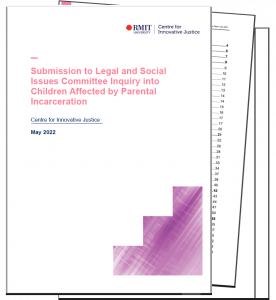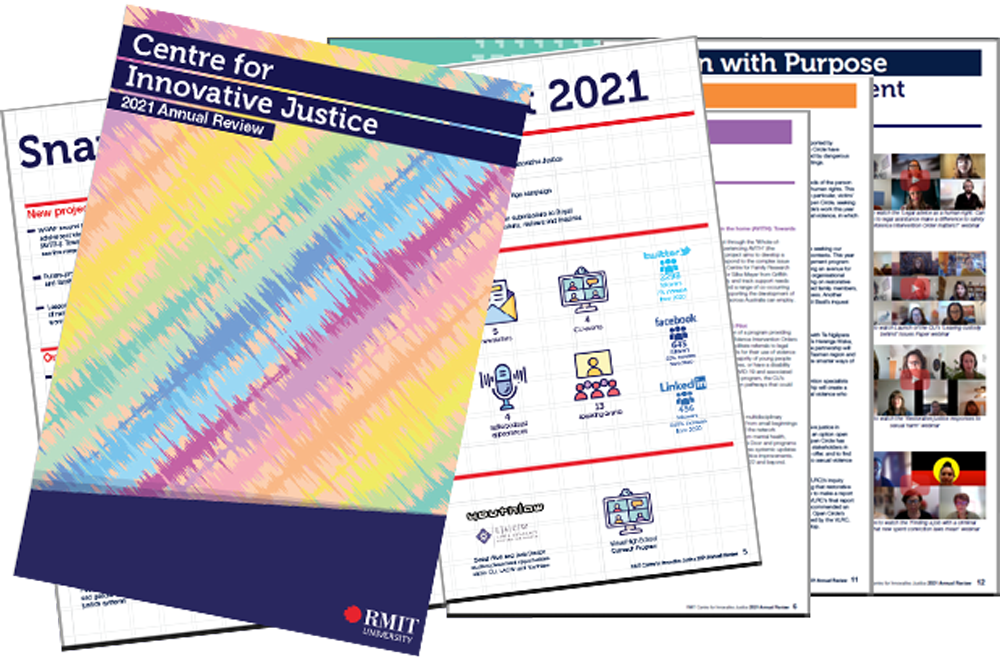August 2022 Newsletter Stories
Scroll down to continue reading our full newsletter stories.
___________________________________________________________
Research to ensure that Aboriginal perspectives inform responses to Aboriginal victims of crime
As we continue into the second half of the year, the CIJ is reflecting on the progress we’ve made in our current projects, celebrating our achievements, and looking ahead to future opportunities to create meaningful change across the justice system.
This includes research commissioned by the Koori Justice Unit (KJU) and Victim Services, Support and Reform (VSSR), which aims to understand the needs, experiences and trajectories of Aboriginal people who have experienced crime victimisation and harm. This crucial work is being carried out under the guidance of a Project Steering Committee comprised of representatives from Djirra, Dardi Munwurro, Elizabeth Morgan House Aboriginal Women’s Service (EMHAWS) and the Koori Engagement Worker network.
To date, we have had the privilege of engaging in rich and productive conversations with the Victorian Aboriginal community, including the Aboriginal Justice Caucus; the AJA4 Women, Families and Victims Collaborative Working Group; representatives from the Regional Aboriginal Justice Advisory Committees (RAJACs); and frontline practitioners from a number of Aboriginal Community Controlled Organisations (ACCOs) and culturally responsive programs. Preliminary findings from these consultations were tested with the Project Steering Committee and Aboriginal Justice Caucus, before being reported back to government in June of this year.
Most recently, we have commenced engagement with Aboriginal people who have experienced crime victimisation and harm through yarning circles and individual yarns. This will include engaging with people in community, as well as in custodial and Corrections settings – recognising that many people who come into contact with the system as offenders have also experienced crime victimisation. Our research team feel incredibly privileged to have been a part of these yarns so far, which highlight the need for strengthened supports for Aboriginal victims of crime.
The CIJ would like to take this opportunity to thank all of those individuals and community organisations who have supported and contributed to the research so far, particularly given the immense pressures faced by ACCOs and the Aboriginal community more broadly as we continue to grapple with the impacts of the COVID-19 pandemic.
We look forward to delivering the project’s final report later this year, which we hope will emphasise the strengths and solutions put forward by Aboriginal community members throughout the research and contribute to the development of a genuinely culturally responsive and holistic system response for Aboriginal people and families who have experienced harm.
___________________________________________________________
Improving access to timely legal and non-legal support for young people using violence in the home
In partnership with Youthlaw, the CIJ is pleased to announce the launch of the Evaluation of the Pre-court Support for Adolescents using violence in the home (AVITH) Pilot Final Report.
The CIJ’s evaluation of Youthlaw’s early and integrated model for responding to young people subject to intervention order proceedings highlighted a number of key program strengths, including:
- the delivery of legal and non-legal support via a Program Lawyer and Youth Family Violence Practitioner with specialist skills in developmentally-appropriate practice and engagement – which in turn improved young people’s engagement and understanding of the legal process;
- the establishment of early referral pathways from a range of frontline services and agencies, which meant that young people could receive legal advice and support prior to the day of court and outside of a chaotic court environment; and
- the capacity of the integrated practice team to link young people in with relevant supports which could mitigate the risk of violence within the family, as well as to create space for young people to disclose their own (historical and current) experiences of violence.
While it was expected that these elements of the Pilot would contribute to improved engagement and understanding of the conditions of final orders, the evaluation found that the vast majority of young people supported through the Pilot exited without any order in place, significantly reducing the likelihood of escalating justice system contact.
In addition, legal matters were resolved with fewer adjournments; related criminal matters were able to be streamlined and the majority were able to be resolved through caution or diversion; and more young people had their intervention order matter resolved without ever needing to come to court.
For families who often reach out to police simply because they want their young person to receive the support that they need, these findings suggest that early, specialist and integrated legal and non-legal support can reduce harmful contact with the justice system while simultaneously improving safety for families.
Crucially, the evaluation also emphasised the prevalence of experiences of adult-perpetrated family violence across the Pilot cohort, including multiple young people who had been misidentified as the predominant aggressor within the family. Where these disclosures were able to inform legal advocacy (including out-of-court negotiations), they often contributed to more appropriate and just outcomes for young people.
We are equally pleased to announce that the Victorian government has provided funding for Youthlaw to continue delivering pre-court support to adolescents using violence in the home until end June 2024. This includes funding an integrated practice team comprising a lawyer and social work-trained youth practitioner in Inner Melbourne, Western Metro and Northern Metro. Enquiries and referrals to the program can be sent to fvprogram@youthlaw.asn.au.
The full report will be launched by Youthlaw on Monday 5 September and will be available on the Youthlaw and Centre for Innovative Justice websites.
___________________________________________________________
Working alongside the sector to future-proof safety for families experiencing family violence
The Future-proofing Safety project, led by the Centre for Family Research and Evaluation (CFRE) at Drummond Street Services, alongside the CIJ and the Australian Institute for Family Studies (AIFS), has been underway since November 2021. The project aims to take a system-wide view of service interactions for people who experienced and used family violence during the COVID-19 pandemic, involving multiple data collection streams to tell the story of how Victorians experiencing and/or using family violence were impacted by COVID-19, as well as how the service system responded and the ongoing impacts of doing so.
The CIJ has been leading sector focus groups, bringing together practitioners from a wide range of services including specialist family violence, mental health, alcohol and other drug (AOD), housing, sexual assault, legal, maternal child health and cohort-specific services. Focus groups have highlighted the deep commitment of practitioners across the system and provided numerous positive examples of sector adaptation and innovation to meet client needs, while also revealing the significant toll that working to maintain service continuity and safety had on practitioners during the pandemic.
We would like to take this opportunity to thank all of the practitioners who took the time to participate in sector focus groups and to share their experiences, even as they continue to work through the continuing impacts of the COVID-19 pandemic, both on clients experiencing entrenched disadvantage and on an exhausted sector.
As well as this crucial engagement with the sector, the CIJ has recently commenced the ‘Client Voice’ stream, which will involve in-depth interviews with people who presented to the system due to their experiences and/or use of family violence during the COVID-19 pandemic.
We look forward to sharing our emerging findings through an ongoing series of interactive reports. You can learn more about the project here.
__________________________________________
The Yallum Yallum Project: Developing a self-determined justice model – Update
The CIJ continues to work alongside the Victorian Aboriginal Community Services Association (VACSAL) and the Grampians Regional Aboriginal Justice Advisory Committee (RAJAC) to support the design of an independent self-determined justice model incorporating an ‘Elders and Respected Persons Council’, to be known as Yallum Yallum. The model aims to promote cultural healing, social and emotional wellbeing and a stronger role in culture and community. As well as to divert people away from and address over representation of Aboriginal people in the justice system. The model was developed through a process of co-design across four workshops with key Aboriginal community members, organisations, and other non-Aboriginal stakeholders. This process involved constant refinement as each workshop drawing on the learnings of the previous workshop. Community members and stakeholders engaged in workshops in two separate streams. This addressed the power imbalance that might be felt between community members and stakeholders who are part of the formal justice system. Co-design with community provided the foundation for the vision and values statement for Yallum Yallum that was then refined by the Steering Committee. This vision and values and the process for actualisation was then discussed with justice stakeholders at the final co-design workshop.
Informed by analysis of the co-design the project team is now working on developing the model. The agreed approach is to start small, identifying and linking in with established resources. As the implementation unfolds the model will provide an opportunity to further identify service gaps and funding necessary to complement and grow the model, in a way that is consistent with the vision and values identified by community.
___________________________________________________________
Inquiry into children affected by parental incarceration
 The CIJ welcomes the recent report from the Legislative Council Legal and Social Issues Committee’s Inquiry into Children Affected by Parental Incarceration. The aim of the inquiry was to shine a light on the plight of children who too often remain invisible to the system when their parents are taken into custody. We are therefore pleased that the report makes 29 key recommendations spanning the adverse impacts of parental incarceration to give greater consideration to children in bail and sentencing decisions, while highlighting the importance of reducing harm and maintaining family connections.
The CIJ welcomes the recent report from the Legislative Council Legal and Social Issues Committee’s Inquiry into Children Affected by Parental Incarceration. The aim of the inquiry was to shine a light on the plight of children who too often remain invisible to the system when their parents are taken into custody. We are therefore pleased that the report makes 29 key recommendations spanning the adverse impacts of parental incarceration to give greater consideration to children in bail and sentencing decisions, while highlighting the importance of reducing harm and maintaining family connections.
The report’s acknowledgement of the need for a differentiated response for women in the justice system, as well as the need for mechanisms to protect the rights of children, is particularly crucial. We know that women in prison are more likely than men to be the primary carer of dependent children or other family members and that the increased use of incarceration against women amounts to ‘double punishment’ for these women, as well as for the children and fractured families left behind.
The CIJ’s submission to the inquiry highlighted the importance of applying a gendered and child-focused lens to the issue of parental incarceration. Our submission set out options for reform that divert women from custody; ensure that children are seen and heard in the criminal justice system; and invest in systems and services to respond appropriately. The CIJ was cited by the inquiry on all of these issues, as well as in relation to the need to consider international frameworks when developing protocols relating to children affected by parental incarceration.
We urge the Victorian Government to give serious consideration to the report’s recommendations and to rethink Victoria’s approach to the incarceration of women – recognising that children are perhaps the most important, yet largely invisible, collateral damage of Victoria’s escalating female imprisonment rate.



